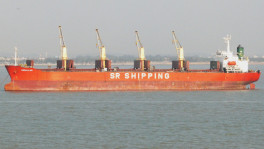Future of Migration: Overseas Employment and Reintegration should get priority

Sayem Mia from Cumilla was determined to change his family's financial condition, and he went to Saudi Arabia in 2019 believing that he could fulfill his dream by migrating abroad.
Like Sayem, every hour, 84 migrant workers leave Bangladesh and go abroad with the hope of spinning the wheels of their fortune for the better.
According to the Ministry of Expatriate Welfare and Overseas Employment and Bureau of Manpower Employment and Training (BMET), more than 12 million Bangladeshis—of whom 8,00,000 were women—have gone abroad as migrant workers from 1976 to 2019. But in 2020, the COVID-19 pandemic caused an unprecedented crisis in the labour migration sector.
BMET data show that only around 217,631 migrants made it to the host countries in 2020, whereas seven lac or more workers made it overseas for jobs in the past four consecutive years, with a record high of 10.08 lac in 2017.
When it comes to the existing job situation, a total of 4,08,408 migrant workers, including 49,924 females, returned home from 29 countries after they lost their jobs following the COVID-19 outbreak, according to data from the Expatriates' Welfare Ministry. Most of them returned almost empty-handed after losing jobs.
A reintegration of these returnees and overseas employment again is the current challenge and should get priority in 2021.
Though the COVID-19 crisis cast a dark shadow on the labour market in 2020, incoming remittances were a silver lining in the dark clouds. Bangladesh received $21 billion in remittances in the last year, which is really good news.
In 16 years of my career in the migration sector – 12 years as a journalist and 4 years as a development professional – whenever I defined Bangladesh to foreigners, I told them, "it is a country of "EFG" where "E" stands for expatriate workers, "F" for farmers and "G" stands for garment workers".
I believe that you do not have to be an economist to say that if all the sectors of Bangladesh, except for these three, collapse, Bangladesh will still survive and the migrants have proved it even in the pandemic. Thanks to the migrants, Bangladesh now has a foreign exchange reserve of more than $43 billion. But despite their contributions, are Bangladeshi migrants getting proper respect and dignity? The answer is, No.
The truth is, we acknowledge the remittance, its high volume and eagerly wait to get a progress-driven GDP at the year-end. But at the same time, the faces behind the numbers are simultaneously being overlooked.
All the problems start with migration costs. Most of our people are not skilled and it is not known to many of us that migration costs from Bangladesh are among the highest in the world but their earnings are the lowest. Middlemen in various stages of the process charge hefty amounts, the end result of which is these high migration costs. Recruiting agencies, middlemen, fraudulent agencies, inaccurate information regarding jobs, purchase and selling of visas at a high price, availing of government permission and so on make their lives difficult. But that is not the end of the story.
Once migrant workers reach their destinations, they often face different kinds of harassment, such as inhuman workload, living in dire conditions, exploitation, abuse, etc. The so-called free visas also lead to the exploitation of migrant workers. With all these existing problems, COVID-19 worsened conditions severely in 2020 and changed the landscape of the migration sector.
Since the COVID-19 pandemic hit the world at the beginning of last year, many Bangladeshi migrant workers have faced economic hardships due to lockdowns enforced on economic activities by the host countries. Some 4.26 lac workers returned home in the eight months since April, note the government data. Thousands of them and their family members have faced economic hardships because of the sudden loss of an income source and work opportunities due to the pandemic. So their reintegration is not only mandatory but also the current challenge.
The BRAC Migration Programme published a survey report last year which said 87 percent of the migrant workers who returned to the country during the coronavirus pandemic now have no sources of income. Now they see a bleak future ahead of them with little or no prospect of jobs anytime soon in the host countries.
In April, the government announced loan support for migrant workers, and a Tk 200 crore special loan fund was created by the Probashi Kallyan Bank (PKB), after borrowing the money from the Wage Earners' Welfare Board. However, the government's initiative largely drew a poor response from the returnees, according to rights groups, due to the tough conditions set for getting the loan and a lack of awareness about it. Additionally, the government created another loan scheme of Tk 500 crore to support returnees' economic reintegration. Most of the money has not been disbursed yet. PKB should find out a way to disburse this money and ensure the sustainable reintegration of the returnees.
Overseas employment is another big challenge now. If we analyze the last year, 73 percent of migrants went to KSA, which makes it clear to us that we don't have any alternative new labour market. The Malaysian government on several occasions has assured Bangladesh of reopening the labour market since September 2018, when the Southeast Asian country suspended recruiting Bangladeshi workers. But it is not yet open. The government should focus on opening this market in 2021.
In 2020, there were some problems in Lebanon, especially after the Beirut blast. Some 1.5 lac Bangladeshi migrants are working in Lebanon, leading miserable lives there due to job losses and wage cuts amid inflation and the coronavirus pandemic. Many of them have demanded that they should be brought back home. This issue needs to be resolved.
Let's have a look at another major issue. The government should also focus on the rights issue. Every day, 8 to 10 dead bodies are similarly being returned to Bangladesh. As these bodies are taken out through the cargo gate at the airport, it is not seen by the mass of people. According to the Wage Earners Welfare Board, approximately 40,000 dead bodies have been returned in the last decade, with the major cause of death being heart attack and stroke, the age of the majority of those who have passed away being 28 to 30. The government should investigate why this huge number of people died in countries chosen as their destinations.
Let's have a look at women's migration. Since 2015, a quarter million Bangladeshi women have gone to the Middle East, mostly Saudi Arabia, in search of livelihood. Many of them have so far returned, with many alleging torture and serious abuse. The government should address this problem.
Considering the present coronavirus situation in various countries, the global labour market might not return to normalcy before the middle of the next year. The government can take this as an opportunity to prepare workers, focusing on new skills that will be required in the post-coronavirus market. Besides exploring new markets, diplomatic efforts should be made to hold on to the existing labour markets.
The killing of 26 Bangladeshis in Libya last year was really a sad event. As opportunities for overseas jobs through the formal channel have dwindled due to COVID-19, human trafficking rackets have become very active in the guise of manpower brokers or travel agents luring aspirant migrants with the promise of good jobs abroad. The law enforcing agencies should be alert to the situation.
According to the UNHCR, Bangladeshis are among the top ten on the lists of people trying to enter Europe through the Mediterranean. From January to November last year, 4,402 Bangladeshis were detained while trying to enter Europe. The journey of Bangladeshis to Europe, along with people from countries like Afghanistan, Syria, Algeria, Morocco, Mali, Ivory Coast, Iraq, Guinea and Sudan also put the image of the country in crisis. We must put a stop to this.
It is true that the government has taken various positive initiatives in the field of migration, but there is still a long way to go. It is also essential to address problems in migration governance in the country, especially lowering migration costs which in Bangladesh is higher compared to that in other labour-sending countries. First, mass awareness is needed. People need to understand that one has to travel through using the regular channels and need to be skilled and possess verified information before migrating. The middlemen have to be monitored and registered and the cost of migration has to be reduced. Additionally, new destination countries must be explored for both men and women.
But before all of that, we have to understand that migrants are not only money-making machines --- they are human beings first and foremost. So, they deserve dignity and if we do not respect our own citizens, no one will. If we honor them today, others will follow tomorrow.
BRAC is closely working with the government in the migration sector and we believe a collective approach from government and non-government organizations and national as well as international stakeholders can only ensure safe migration and sustainable reintegration, which can further be of support in mitigating the challenges raised by the COVID-19 pandemic.
Shariful Hasan is the programme head of BRAC's Migration Programme and a freelance journalist.


 Keep updated, follow The Business Standard's Google news channel
Keep updated, follow The Business Standard's Google news channel
















